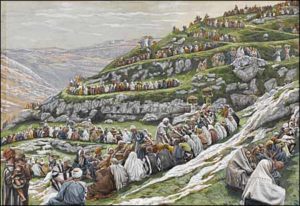Jn 6:1-15
Jesus went across the Sea of Galilee.
A large crowd followed him,
because they saw the signs he was performing on the sick.
Jesus went up on the mountain,
and there he sat down with his disciples.
The Jewish feast of Passover was near.
When Jesus raised his eyes
and saw that a large crowd was coming to him,
he said to Philip,
“Where can we buy enough food for them to eat?”
He said this to test him,
because he himself knew what he was going to do.
Philip answered him,
“Two hundred days’ wages worth of food would not be enough
for each of them to have a little.”
One of his disciples,
Andrew, the brother of Simon Peter, said to him,
“There is a boy here who has five barley loaves and two fish;
but what good are these for so many?”
Jesus said, “Have the people recline.”
Now there was a great deal of grass in that place.
So the men reclined, about five thousand in number.
Then Jesus took the loaves, gave thanks,
and distributed them to those who were reclining,
and also as much of the fish as they wanted.
When they had had their fill, he said to his disciples,
“Gather the fragments left over,
so that nothing will be wasted.”
So they collected them,
and filled twelve wicker baskets with fragments
from the five barley loaves
that had been more than they could eat.
When the people saw the sign he had done, they said,
“This is truly the Prophet, the one who is to come into the world.”
Since Jesus knew that they were going to come and carry him off
to make him king,
he withdrew again to the mountain alone.
Bishop Barron:
Friends, our Gospel today focuses on St. John’s intense meditation on the meaning of the Eucharist. The tone is set with the familiar story of the feeding of the five thousand, the only miracle story mentioned in each of the four Gospels. This scene deeply affected the first Christians.
Jesus instructs the crowd to recline on the grass. Taking the barley loaves and dried fish, Jesus makes a meal that satisfies the enormous crowd. They are hungry, tired, and worn out from their exertions, and Jesus gives them sustenance for the day.
For Thomas Aquinas, the great metaphor for the Eucharist is sustenance, food for the journey. Baptism defines us, making us sons and daughters of God; Confirmation confirms and deepens this identity; Marriage and Holy Orders seal us in our life’s vocation. These are sacraments offered once at key moments in one’s life.
Then there is the Eucharist, which is daily food, nourishment to get us through the day-to-day. How effective would we be if we never ate, or ate only on special occasions and in a festive environment? Not very. So, in the spiritual life, we must eat and drink or we will not have the strength.


Recent Comments